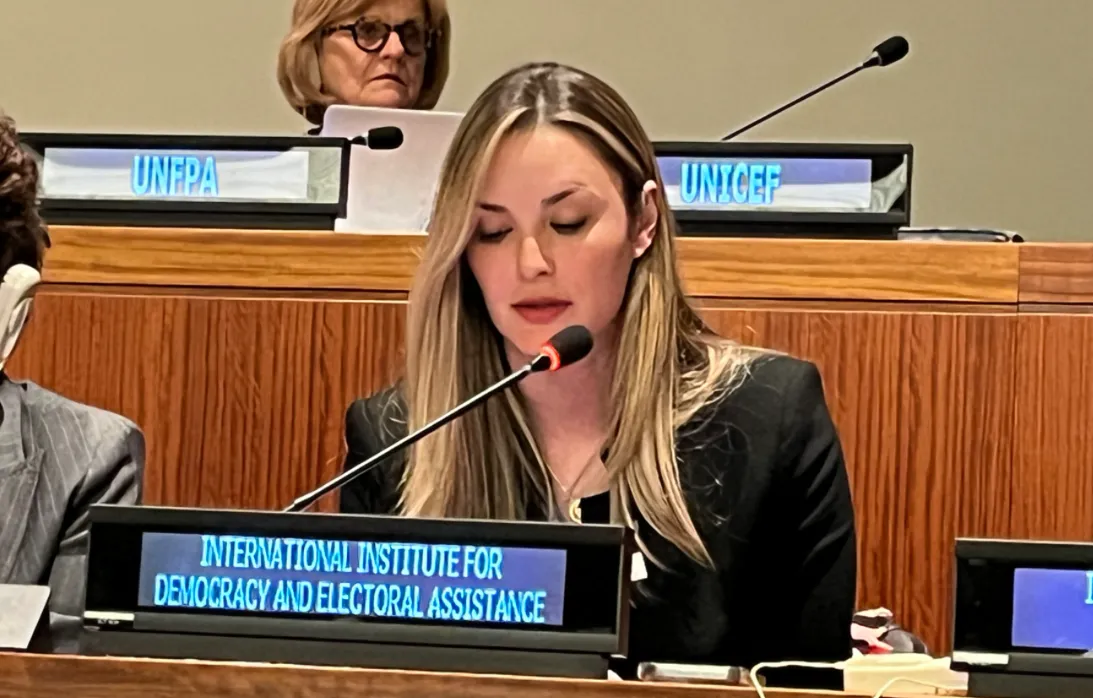Statement at the 68th Commission on the Status of Women

68th Commission on the Status of Women
General Discussion
19 March 2024, UNHQ, New York
Statement by
International Institute for Democracy and Electoral Assistance
Excellencies,
Strengthening democratic institutions and processes is key for accelerating the achievement of gender equality and the empowerment of all women and girls. Indeed, democracy is the political system best equipped to achieve these goals. Equally, gender equality is essential for democracy, as well as for sustainable development more broadly.
According to International IDEA's Global State of Democracy Indices, levels of gender equality are higher in democracies than in non-democratic regimes. The reasons for this are many. Relative to other forms of government, democracies provide more equal access to political power; produce more inclusive, participatory, and representative decision-making; and develop more effective, accountable, and transparent institutions, with lower levels of corruption. All of these elements are critical for the empowerment of women and girls. Data from International IDEA Global State of Democracy reports have shown that only 3% of democracies perform very poorly on gender equality measures. For authoritarian regimes, the proportion is 50%. And since we know that the achievement of not just SDG5 but the SDGs overall depends upon further progress on gender equality, this means that democracy drastically improves the likelihood of success in achieving the 2030 Agenda.
Unfortunately, despite some advances, gender inequalities remain deeply entrenched in many parts of the world, particularly in non-democratic contexts. Even where equal rights exist in law, they can be denied in practice, with women facing limitations on their ability to pursue elected positions of power due to political violence and harassment, including online, as well as conflict and cultural barriers.
Despite recent progress, less than one-quarter of Members of Parliament globally are women. The situation is no better for heads of government, where at the current rate of progress, gender parity will not be reached until 2150. And the figures at sub-national representative organs and within political parties are even worse. International IDEA has long championed the use of gender quotas in legislatures, and such measures remain important. Yet transformative change also requires attention to broader institutions, processes, and systemic injustices that prevent women and girls from fully exercising their political rights.
Besides being a necessary goal in its own right, advancing gender equality also strengthens various aspects of democracy and citizen participation captured in SDG16 and monitored through the SDG16 Data Initiative, including electoral integrity, combatting corruption, political participation and representation, access to information and communication technologies (ICTs), and media freedom. We would particularly like to highlight the following elements, in line with the principles laid out by the Gender Cohort of the Summit for Democracy:
First, gender equality is fundamental to the electoral process because it enables women—as voters, candidates, and elected officials—to influence public policy and advocate for their interests.
Second, combating corruption effectively requires a gender perspective. Women are affected by corruption in distinct and often disproportionate ways, and often bring unique approaches to anti-corruption efforts.
Third, if access to ICTs is equal, these technologies can help close gender gaps in women’s political participation. They can serve as tools for women to influence policy agendas, increase women’s access to campaign resources, strengthen networks of solidarity, and increase women’s representation in democratic agendas and processes.
Women and girls play a key role in advancing and achieving both democracy and sustainable development. SDGs 5 and 16 thus go hand in hand and must be pursued in tandem if the Agenda 2030 is to succeed. International IDEA reiterates its full commitment to gender equality as an essential part of our mission. We will continue to work with Member States, the UN system, civil society, and other stakeholders to accelerate the empowerment of all women and girls. A more peaceful, just, and democratic world demands no less.
